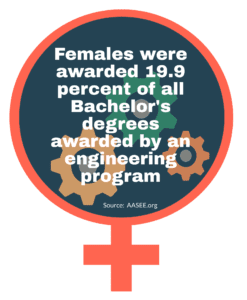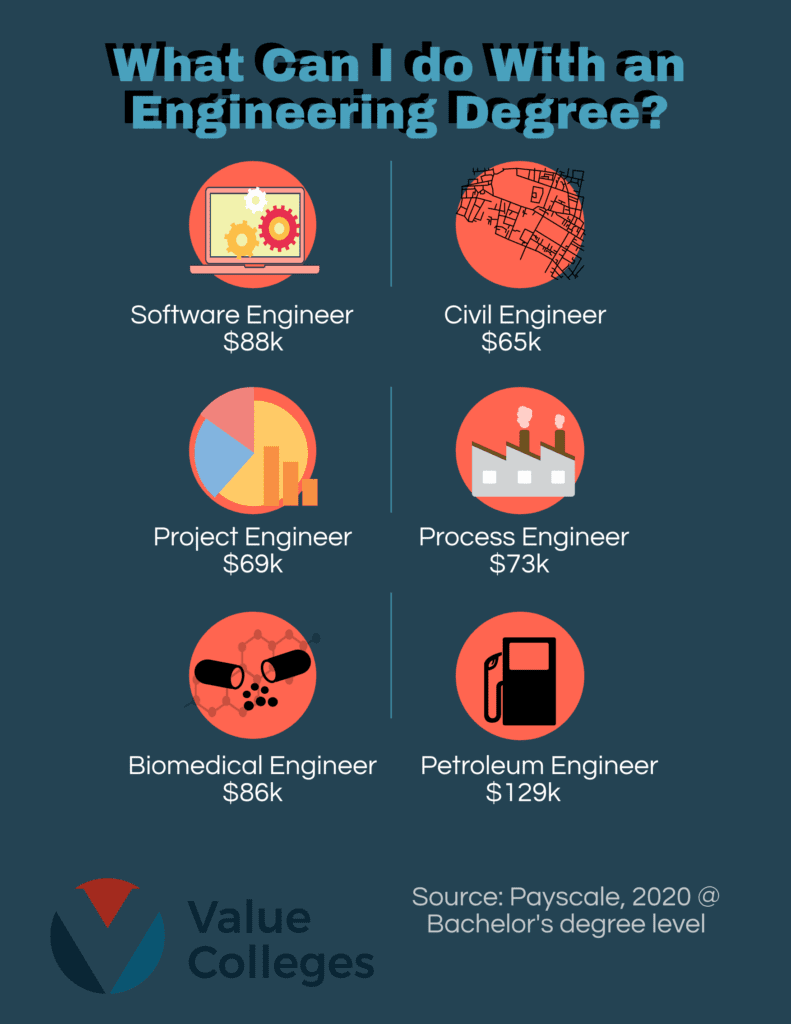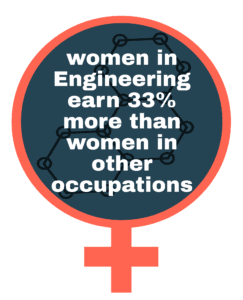What Can I Do with an Engineering Bachelor’s?

Find your perfect value college
When you are looking into career options and your education, you may consider a bachelor’s degree in engineering as a solution to reach your goals. An engineering degree offers an opportunity to work on the design and use of technology, machines, and other projects. It gives you the tools to build new products or to innovate existing items to improve the product.
What is Engineering?
The concept of engineering is a practice that applies scientific principles to machine and structure construction. Examples would include roads, buildings, tunnels, bridges, and vehicles. The term engineering has its roots in the Latin word Ingenium – which means to devise with cleverness.
Featured Programs

Engineering is mostly categorized within four broad branches –
- Civil Engineering – subcategories include environmental, structural, engineering, and surveying.
- Mechanical Engineering – subcategories include turbines, engines, weapons, robotics, audio, and mechatronics, to name a few.
- Electrical Engineering – subcategories include broadcasting, electric circuits, motors, optoelectronic devices, telecommunications, computer systems, to name a few.
- Chemical Engineering – subcategories include petroleum refining, and bimolecular productions, to name a few.
Have you considered engineering as a career option and wonder which of the many and best engineering degrees to get if you are to meet your career objectives?
Maybe you have asked yourself what is the difference between engineering technology vs engineering?
What Does an Engineer Do in General?
The branch of science & technology known as engineering, focuses upon the efforts required to effectively and safely build and maintain structures, machinery, and engines. When considering the best engineering degrees to get and to look for the answer to the question – What does an engineer do in general? – remember, there are many engineering subspecialties to review when considering the profession of engineering as a career option. These engineering subcategories include –
- Architectural Engineering.
- Chemical Engineering.
- Civil Engineering.
- Computer Engineering.
- Electrical Engineering.
- General Engineering.
- Mechanical Engineering, among others.
Whether one, considers an engineering technology vs engineering degree program, all engineering degree candidates become skilled at solving problems in both developed and developing countries around the world.
Engineering students who have yet to decide upon a more refined engineering field of study often have the opportunity to start an undergraduate engineering degree program without an engineering major. The general engineering degree program allows students to discover the differences between an engineering technology vs engineering degree program, before declaring an engineering major.
Engineering School/Program Accreditation: What is Accreditation?
The concept of accreditation rivals that of a quality control process. Essentially, accreditation confirms that schools and programs offer the same quality education promised on proprietary websites and college-level course catalogs. There are two generalized types of certification – Regional Accreditation and Specialized Accreditation. These are discussed below.
Regional Accreditation
An institution of higher learning that has received regional accreditation has passed the standards set forth (and enforced) by seven regional agencies recognized by the United States Department of Education (USDE).
Regional accreditation is often recognized as a lofty form of accreditation as it is awarded by the United States federal government.
Specialized Accreditation
Specialized accreditation is generally bestowed by industry-sanctioned oversight organizations and agencies. Specialized accreditation is voluntary and available at the graduate and undergraduate level and often sets forth accreditation criteria that are considered stricter than regional accreditation. Read on to learn the answer to the question – Is ABET accreditation important?
The Accreditation Boards of Engineering and Technology – ABET
Is ABET accreditation Important?
Engineering students exploring the many options of engineering school accreditation will likely find that the majority of the best engineering undergraduate schools in the world have met the ABET accreditation requirements.
Does ABET Accreditation Matter?
The Accreditation Boards of Engineering and Technology (ABET) is an independent agency that operates without government guidance or intervention. Students researching engineering schools to attend should confirm that the desired program meets ABET accreditation requirements.

An ABET accredited online degree offers potential degree candidates the assurance (from a neutral party) that the engineering degree program meets strict engineering industry standards – ABET accreditation requirements and criteria.
Are you still wondering – Does ABET accreditation matter? More than 4,000 engineering & technology degree programs are recognized as ABET accredited online degree programs. Those students graduating from ABET accredited programs enter the workforce with the education and training needed for future engineering leaders.
Types of Bachelors Degree in Engineering
Are you ready to enroll in a Bachelors in Mechanical Engineering online program?
There are many types of academic engineering programs to consider. To ensure you undertake a comprehensive investigation into the engineering degree or field that best suits your skills and interests, it is essential to find the answers to the following questions and issues –
- Can you get an engineering degree online?
- What college classes for engineering degrees are required?
- Where can you find the best undergraduate engineering schools that offer online and hybrid degree programs?
- Are there online mechanical engineering bachelor degree programs available?
- What are the requirements for engineering degree programs?
- What are the most affordable engineering schools online and nearby?
- Do engineering schools offer accelerated engineering programs?
- What are the typical engineering bachelor degree requirements?
- What are the in-demand engineering careers for those who hold a bachelors degree in engineering?
- How does a Bachelor of Engineers vs Bachelor of Science degree compare, and do they have the same requirements for engineering degree programs?
- What are the available engineering technology degree online programs?
- Does each engineering school have the same engineering bachelor degree requirements?
The reality is that those who hold a Bachelor of Engineering Technology degree, or any other engineering specialty, have a multitude of career options within a variety of industries.
But, can you get an engineering degree online? Is there a Bachelor’s in Mechanical Engineering online program?
Once you have determined the best undergraduate engineering schools that fit your self-defined criteria, it is important to decide if your career goals can be met by enrolling in an online mechanical engineering bachelor degree program. There are many programs that offer an engineering technology degree online programs from some of the most affordable engineering schools.
Some of the best undergraduate engineering schools provide educational opportunities that include accelerated engineering programs as follows–
- The most affordable online engineering degree.
- An accelerated engineering degree online program.
- Accelerated engineering degree programs in a hybrid format.
A Bachelor of Engineering vs Bachelor of Science degree is a comparison the reveals the career opportunities for these two degrees to offer similar career opportunities. The requirements for an engineering degree (in addition to the college classes for engineering students) may differ slightly, so it is important to understand the difference before making a final engineering career decision.
Careers in Engineering
The engineering industry is comprehensive and far-reaching and offers many types of engineering careers. Engineering skills are required to keep any industry operating safely and effectually. Therefore, engineers can find rewarding working in a variety of different industries.

According to the federal government’s Bureau of Labor Statistics (BLS), the engineering industry (in conjunction with the architecture industry) is anticipated to grow at the average combined industry growth rate of 4% through the year 2028. As you continue to fine-tune your college degree options, consider the following relevant questions –
- What is the best engineering degree for jobs that are in-demand?
- Is mechanical engineering a good career to fit my interests?
- What to do with engineering degree in technology?
- What are the medical engineering technology jobs most in-demand?
- What are engineering job requirements for nuclear or petroleum engineers?
- What to do with engineering degree in the aerospace field?
- What is considered the highest paid engineering field?
- What to do with engineering degree?
- Are there any non traditional engineering jobs to consider?
- What can you do with an engineering degree besides engineering traditional occupations?
- Are there engineering technology degree jobs that allow for remote workers?
The following list identifies the different types of engineering careers, including nontraditional engineering jobs –
| Aerospace Engineering Jobs | An Aerospace engineer is a specialist that works with satellites, missiles, and aircraft. This engineering specialty is often considered among the highest paid engineering field specialties. |
| Agriculture Engineering Jobs | An Agricultural engineer is tasked with problem-solving in the realm of buildings, the supply of power, and environment issues, among others. |
| Bio Medical Engineering Jobs | A Biomedical engineer has the skillset the integrates medicine science and engineering to create effective medical equipment. This is one of the engineering technology degree jobs that integrates the field of medicine. |
| Chemical Engineering Jobs | A Chemical engineer combines many scientific fields to solve problematic issues in food, drugs, and fuel use, to name a few. |
| Civil Engineering Jobs | A Civil engineer manages the design and construction of infrastructures. |
| Electrical & Electronics Engineering Jobs | An Electrical engineer manages and innovates electronic devices and issues. Both engineering careers have similar engineering job requirements. |
| Environmental Engineering Jobs | An Environmental engineer applies the fields of biology, soil science, and engineering to solve environmental concerns. |
| Health & Safety Engineering Jobs | A Health and safety engineer develops procedures to ensure the safe design of anything manufactured designed for the public. |
| Industrial Engineering Jobs | An Industrial engineer creates effective systems to streamline people, systems, and machinery. |
| Mining Engineering Jobs | A Mining and geological engineer develops a safe, effective process for mining materials needed in manufacturing. |
| Materials Engineering Jobs | A Materials engineer designs processes and evaluates test materials. |
| Mechanical Engineering Jobs | Is mechanical engineering a good career? Mechanical engineering technology jobs offer careers in the design and construction of devices that work as thermal sensors. |
| Nuclear Engineering Jobs | A Nuclear engineer researches and designs instruments to create safe use of nuclear energy. |
| Petroleum Engineering Jobs | A Petroleum engineer solves gas and oil extraction processes and listed among the highest paid engineering field jobs. |
What can you do with an engineering degree besides engineering?
To answer this question, it helps to review the types of engineering careers different industries offer. The tables shown below should help further refine your academic degree options.
Industry Profiles for Engineering Degrees
The data that follows has been extracted from the federal government’s Bureau of Labor Statistics (BLS).
The following industries represent those that offer the highest salaries, on average, to professional engineers –
| The Oil/Gas Extraction Industry | $120, 550 Per Year. |
| The Executive Branch (OES) | $116,490 Per Year |
| The Video & Movie Industry | $115,380 Per Year. |
| Scientific/Technical Industries | $115,170 Per Year. |
| Merchant Wholesalers | $112,160 Per Year. |
The following industries represent those industries that have the highest concentration of professional engineers –
| The Executive Branch (OES) | $116,490 Per Year. |
| Architecture/Engineering Services | $ 92,130 Per Year. |
| Research/Development Industries | $110,600 Per Year. |
| Aerospace/Manufacturing Industries | $105,160 Per Year. |
| Management of Enterprises | $103,320 Per Year. |
Salary
The United States’ federal government’s Bureau of Labor Statistics, provides historical and recent employment data of many occupations available in the United States that allows engineering students to determine the highest paying engineering jobs available. The types of engineering and salaries will vary based on location, experience, and industry, among other essential variables. As such, an electrical engineering technology salary will likely be different from a computer engineering technology salary, as well as different from an engineering technology degree salary.
Which Engineering has the Highest Salary?
The highest paying engineering jobs typically include petroleum, nuclear, and aerospace engineers.
According to the United States’ federal government’s Bureau of Labor Statistics (BLS), the national wage estimates for the more than 140,000 engineering professionals working as of May 2018 to be as follows –
Median Annual Pay — $ 96,980
Median Hourly Wages — $ 46.62
The above-noted salary statistics include –
- A computer engineering technology salary.
- An Electrical engineering tech ology salary.
- An engineering technology degree salary, among other engineering salary stats.
When comparing an engineering technology salary vs engineering salary, it is helpful to consider the different types of engineering and salaries as they fall within the following salary percentile spectrum –
| Salary Percentile | Salary |
| 10% | $ 50,750 Per Year. |
| 25% | $ 69,890 Per Year. |
| 50% | $ 96,980 Per Year. |
| 75% | $126,200 Per Year. |
| 90% | $155,650 Per Year. |
For 2018, the types of engineering and salaries for professionals in the engineering industry are as follows –
| Engineer Job Type | 2018 Median Salary |
| Aerospace Engineers | $115,220 Per Year. |
| Agriculture Engineers | $ 77,110 Per Year. |
| Bio Medical Engineers | $ 88,550 Per Year. |
| Chemical Engineers | $104,910 Per Year. |
| Civil Engineers | $ 86,640 Per Year. |
| Electrical & Electronics Engineers | $ 99,070 Per Year. |
| Environmental Engineers | $ 87,620 Per Year. |
| Health & Safety Engineers | $ 89,130 Per Year. |
| Industrial Engineers | $ 87,040 Per Year. |
| Marine Engineers | $ 92,560 Per Year. |
| Materials Engineers | $ 92,390 Per Year. |
| Mechanical Engineers | $ 87,370 Per Year. |
| Nuclear Engineers | $107,600 Per Yea.r |
| Petroleum Engineers | $137,170 Per Year. |
Which engineering has highest salary?
Based on the above table, Petroleum engineers, for 2018, were some of the highest paying engineering jobs.
In addition to learning the differences between an engineering technology salary vs engineering salaries, it is helpful to understand which states offer the highest wages for professional engineers. The median salary for engineering professionals is the highest for jobs located in the following states –
| California | $133,780 Per Year |
| Alaska | $122,880 Per Year |
| Massachusetts | $122,740 Per Year |
| New Jersey | $122,100 Per Year |
| New York | $120,970 Per Year |
The Best Engineering Jobs for the Future
The final consideration when researching the engineering industry for a prospective career is to look into the predictions for the best engineering jobs for the future. It is prudent to consider the external factors that might help you decide which engineering branch is best for future engineering careers?
Read on to discover which engineering branch is best for future engineering professionals with your interests, skills, and career objectives. But, note that the engineering specialties noted below are just a partial list, but is representative of the current engineering marketplace.
Collectively, the selected engineering pathways noted below indicate that the automation and data science engineers lead the pack of the future of engineering. Engineering specialists tend to earn higher salaries and find a more natural entry-level path into the industry than those engineers without an engineering specialty.
Petroleum Engineer
The world’s current dependence on petroleum and other fossil fuels has been and continues to create a strong demand for petroleum engineers across the globe. A Petroleum engineer is tasked with the responsibility of creating a drilling plan – including the design of the equipment and the implementation of the drilling sequence.
Petroleum engineers remain an in-demand engineering specialty in spite of the worldwide environmental push for the use of cleaner energy. Some students may actually find themselves negotiating an internal dilemma regarding the use of fossil fuels.
According to the United States’ federal government’s Bureau of Labor Statistics (BLS), the median salary of a petroleum engineer for 2018 was $137,170 per year, which translates to $65.95 per hour.
Science & Machine Learning
Software and computer engineers are the innovators and coders that design and develop software programs to meet the needs of consumers, businesses, and government entities. Machine Learning specialists put ideas into action and create a meaningful perspective of tremendous amounts of data, which while remaining disorganized, offers no valuable insight. While science and machine learning engineers possess strong programming abilities, their responsibilities generally seek to solve problems by analyzing the specifics of an electronic or digital issue.
Alternative Energy Engineer
An Alternative Energy Engineer includes any engineer that works in other energy industries that fossil fuels – coal and petroleum. Alternative Energy engineering specialties include wind, nuclear, solar power, and geothermal energy, to name a few.
Climate change activists and scientists have been alerting the governments of all nations about the potential harm climate change could bring without a proactive effort to slow the documents changes to weather patterns across the world. Those interested in working as an alternative energy engineer typically earn a Bachelor of Science (BS)in Electrical Engineering or Mechanical Engineering first and then complete a graduate level engineering degree program in energy.
Example – According to the Bureau of Labor Statistics (BLS), Nuclear Engineers had a median salary of $107,600 per year, which translates to $51.73 per hour.
Automation & Robotics Engineer
With the advent of the field of robotics (including artificial intelligence), the engineering specialties of robotics and automation is anticipated to be in-demand engineering for many years to come. Most robotic and automation engineers begin their education path with a Bachelor of Science (BS) degree in mechanical technology engineering, electro-mechanical engineering, electronic engineering, or mechanical engineering.
Mechanical engineers are tasked with the responsibility of designing, constructing, and maintaining mechanical and thermal devices. As the world becomes more automated overall, an automation or robotics engineer will become an ultra in-demand engineering specialty.
According to the United States’ federal agency – the Bureau of Labor Statistics (BLS), Mechanical Engineers had a median salary of $87,370 per year, which translates to $42.00 per hour. Electrical Engineers, during May 2018, had a median salary of $96,630 per year, which translates to $46.46.
Civil Engineering
A civil engineer is responsible for constructing infrastructures across the globe. Civil engineering includes the following subcategories – transportation engineering, structural engineering, highway or road engineering, and environmental engineering, among others. Because the civil engineering specialty includes a wide swarth of the engineering market, the job market tends to avoid being oversaturated.
In accordance with the federal government’s Bureau of Labor Statistics (BLS), Civil Engineers had a median salary of $86,640 per year, which translates to $41.65 per hour. Environmental Engineers, in 2018, had a median salary of $87,620 per year, which translates to $42.13.
Mining and Geological Engineering
The concept of Mining is indicative of the beginning stages of any manufacturing process. Engineers that specialize in mining possess the professional skills to develop effective, efficient, and safe methods to extract minerals (nickel, copper, lithium, etc.) from the earth for a multitude of products across all industries. A mining engineer oversees the design and building of underground mines or mining pits. A mining engineer is also tasked with finding innovative and cost-conscious transportation systems to bring the mined materials to contracted processing plants.
According to the United States’ federal Bureau of Labor Statistics (BLS), Mining & Geological Engineers had a median salary of $92,250 per year, which translates to $44.35 per hour. Environmental Engineers, in 2018, had a median salary of $87,620 per year, which translates to $42.13.
Related Rankings:
Top 25 Best Value Engineering Programs
Top 25 Best Value Online Engineering Bachelor’s
Top 10 Most Affordable Online Applied Engineering Programs
Top 10 Cheapest Online Engineering Technology Management Programs
Featured Programs
Aya Andrews
Editor-in-Chief
Aya Andrews is a passionate educator and mother of two, with a diverse background that has shaped her approach to teaching and learning. Born in Metro Manila, she now calls San Diego home and is proud to be a Filipino-American. Aya earned her Masters degree in Education from San Diego State University, where she focused on developing innovative teaching methods to engage and inspire students.
Prior to her work in education, Aya spent several years as a continuing education consultant for KPMG, where she honed her skills in project management and client relations. She brings this same level of professionalism and expertise to her work as an educator, where she is committed to helping each of her students achieve their full potential.
In addition to her work as an educator, Aya is a devoted mother who is passionate about creating a nurturing and supportive home environment for her children. She is an active member of her community, volunteering her time and resources to support local schools and organizations. Aya is also an avid traveler, and loves to explore new cultures and cuisines with her family.
With a deep commitment to education and a passion for helping others succeed, Aya is a true inspiration to those around her. Her dedication to her craft, her community, and her family is a testament to her unwavering commitment to excellence in all aspects of her life.
